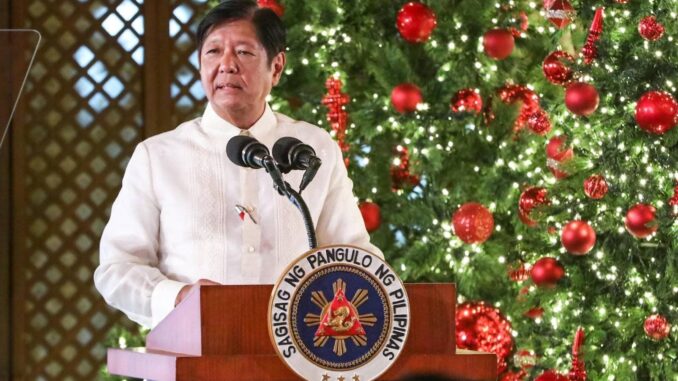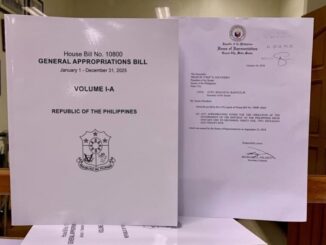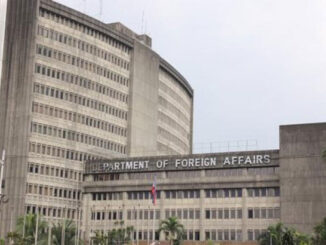
MANILA, Philippines — President Ferdinand Marcos Jr. did not veto the P26-billion Ayuda para sa Kapos ang Kita Program (AKAP) in the 2025 budget but added two new agencies to oversee the fund that some senators say was a surprise insertion last year.
The controversial cash aid program will now require coordinated guidelines from the Department of Social Welfare and Development (DSWD), Department of Labor and Employment (DOLE), and National Economic Development Authority (NEDA) — a change from its previous implementation where DSWD was the sole implementing agency.
“To ensure that government assistance is not merely a provisional solution to a persistent issue, we are compelled to subject the implementation of the Ayuda sa Kapos ng Kita program or AKAP to the convergence efforts of the DSWD, DOLE, and NEDA,” Marcos said during the budget signing ceremony in Malacañang on Monday, December 30.
AKAP is a program under the DSWD that distributes one-time cash aid to “near poor” minimum wage earners. It first materialized in the 2024 budget as a P26.7-billion item reportedly inserted by the House, led by Speaker Martin Romualdez, the president’s cousin.
The program has since drawn criticism, with Vice President Sara Duterte previously alleging that AKAP funds were being used for vote-buying. Meanwhile, retired Supreme Court Senior Associate Justice Antonio Carpio likened AKAP to pork barrel funds and said lawmakers’ involvement is deliberately omitted on paper to circumvent restrictions.
DSWD Secretary Rex Gatchalian has defended his agency’s cash aid program and insisted that it is social workers — not barangay officials — who determine qualified recipients. He has denied allegations of the fund being used by House lawmakers.
Budget Secretary Amenah Pangandaman said at a press conference that while the funds remain intact, new guidelines must be established before any disbursement.
“It’s just before we release the funds, we need to issue guidelines together with DSWD, DOLE and NEDA,” she said, adding that NEDA Secretary Arsenio Balisacan will help define the fund release protocols.
Marcos argued the implementation of AKAP will be “strategic” and lead to long-term improvements in the lives of its recipients while “guarding against misuse and duplication and fragmented benefits.”
The president said additional fiscal controls will be in place for all items in the 2025 budget: “[We] ensure that all increases in appropriations and new budgetary items shall now be subject to cash programming, applicable budget execution rules, and vetting and approval of the concerned offices.”
What went before
AKAP’s inclusion in the current year’s budget and the proposed spending plan for next year had alarmed some senators, including Sen. Imee Marcos, who implied that the fund was redundant with another DSWD program and, hence, open to misuse.
In February 2024, Marcos, the president’s sister, first flagged the program during a hearing on the people’s initiative. She said she discovered it through a text message alleging that “all soft projects including AKAP must go through the office of the Speaker.”
“I understood AKAP was under the DSWD budget. If you recall, in the Senate, I handle the DSWD budget. But like the Comelec’s mysterious additional P12 billion, this P26.7 billion in the budget of the DSWD is alien to me,” Marcos said during the hearing.
At the time, DSWD Undersecretary Fatima Aliah Dimaporo said that AKAP was “technically foreign in the sense that it has no guidelines yet, so it does not exist as a program.”
Sen. Koko Pimentel had also criticized the allotted funds for AKAP, which he said was a “dole-out program with very unclear mechanics.” He said senators have been excluded from its distribution as if it was a “secret, invisible, off-limits program.”
When the House of Representatives proposed to increase AKAP’s funding to P39 billion for 2025, the Senate, through Sen. Marcos, removed the allocation entirely from the upper chamber’s version of the budget.
“I deleted it entirely. I proposed to merge the AICS and AKAP and pool it into one standby fund for those in need. That way, there will be no dispute or jealousy over the fund allocation,” Marcos explained in November, referring to DSWD’s other cash aid program, the Assistance to Individuals In Crisis Situations.
The bicameral conference committee later restored funds for AKAP but reduced its funding to P26 billion.
Sen. Grace Poe, who initially opposed the program in November as chair of the Senate finance panel, supported its partial restoration after she said lawmakers clarified its purpose during bicam deliberations.





Be the first to comment